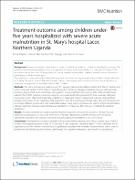| dc.contributor.author | Nyeko, Richard | |
| dc.contributor.author | Calbi, Valeria | |
| dc.contributor.author | Ssegujja, Boniface Otto | |
| dc.contributor.author | Ayot, Grace Flona | |
| dc.date.accessioned | 2021-07-27T19:27:53Z | |
| dc.date.available | 2021-07-27T19:27:53Z | |
| dc.date.issued | 2016 | |
| dc.identifier.citation | Nyeko, R., Calbi, V., Ssegujja, B. O., & Ayot, G. F. (2016). Treatment outcome among children under-five years hospitalized with severe acute malnutrition in St. Mary’s hospital Lacor, Northern Uganda. BMC Nutrition, 2(1), 1-7. | en_US |
| dc.identifier.uri | https://hdl.handle.net/123456789/295 | |
| dc.description.abstract | Background: Severe malnutrition contributes to more than 60 % of deaths in children in developing countries. The
minimum international standard set for management of severe acute malnutrition is a cure rate of at least 75 %
and death rate of less than 10 %, yet the outcome of severely malnourished children treated in most hospitals in
developing countries remain poor.
This study was conducted to determine the treatment outcomes among severely malnourished children admitted
at St. Mary's hospital Lacor in Northern Uganda during a one year period in order to inform clinical decisions to
maximize management of severely malnourished children.
Methods: This was a retrospective study involving 251 severely malnourished children treated at St. Mary's hospital Lacor
within a one year period in 2014. Patients' medical records in the facility therapeutic feeding unit were retrospectively
reviewed using a check list to collect basic demographic, clinical, and treatment outcome data of the sampled study
patients. The UNICEF treatment outcome categories were used, and further grouped into three summary categories:
"successful (cured)", "died" and "potentially unsatisfactory". Data were entered, cleaned and analyzed using statistical
package SPSS version 13. For categorical data, proportions with 95 % confidence intervals, odds ratio and Chi-square test
to compare different groups were used. Multivariate analysis using logistic regression was used to analyze the association
between treatment outcome and potential associated factors. P values less than 0.05 was considered for statistical
significance.
Results: The study consisted 251 patients and the treatment outcome was successful (cured) in 168 (66.9 %) and
potentially unsatisfactory in 53 (21.2 %), while 30 (11.9 %) died. Hypothermia and HIV infection were the factors
significantly associated with mortality among the severely malnourished children in the current study.
Conclusions: The treatment cure rate of severely malnourished children admitted at St. Mary's hospital Lacor of 66.9 %
is below the accepted standard of least 75 % cure rate. A high proportion of patients died (11.9 %) or defaulted (8.0 %).
Hypothermia and HIV infection were the factors significantly associated with mortality. We recommend that in order to
address the high default rate, home based care through the outpatient therapeutic care should be strengthened. | en_US |
| dc.language.iso | en | en_US |
| dc.publisher | BMC Nutrition | en_US |
| dc.subject | severe acute malnutrition | en_US |
| dc.subject | Children | en_US |
| dc.subject | Northern Uganda | en_US |
| dc.title | Treatment outcome among children underfive years hospitalized with severe acute malnutrition in St. Mary’s hospital Lacor, Northern Uganda | en_US |
| dc.type | Article | en_US |

